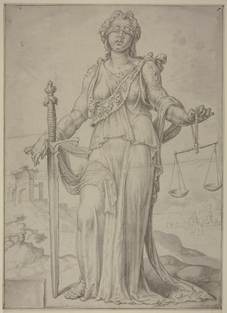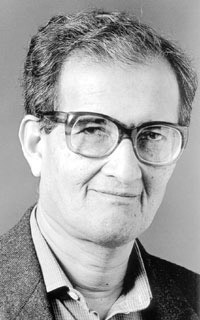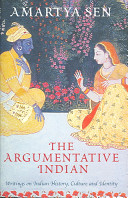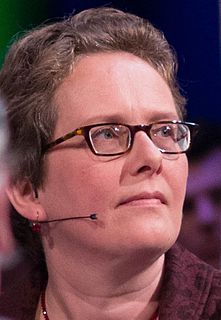
Justice, in its broadest context, includes both the attainment of that which is just and the philosophical discussion of that which is just. The concept of justice is based on numerous fields, and many differing viewpoints and perspectives including the concepts of moral correctness based on ethics, rationality, law, religion, equity and fairness. Often, the general discussion of justice is divided into the realm of social justice as found in philosophy, theology and religion, and, procedural justice as found in the study and application of the law.
In social choice theory, Arrow's impossibility theorem, the general possibility theorem or Arrow's paradox is an impossibility theorem stating that when voters have three or more distinct alternatives (options), no ranked voting electoral system can convert the ranked preferences of individuals into a community-wide ranking while also meeting a specified set of criteria: unrestricted domain, non-dictatorship, Pareto efficiency, and independence of irrelevant alternatives. The theorem is often cited in discussions of voting theory as it is further interpreted by the Gibbard–Satterthwaite theorem. The theorem is named after economist and Nobel laureate Kenneth Arrow, who demonstrated the theorem in his doctoral thesis and popularized it in his 1951 book Social Choice and Individual Values. The original paper was titled "A Difficulty in the Concept of Social Welfare".

A Theory of Justice is a 1971 work of political philosophy and ethics by John Rawls, in which the author addresses the problem of distributive justice. The theory utilises an updated form of Kantian philosophy and a variant form of conventional social contract theory. Rawls's theory of justice is fully a political theory of justice as opposed to other forms of justice discussed in other disciplines and contexts.
In philosophical ethics, welfarism is a form of consequentialism. Like all forms of consequentialism, welfarism is based on the premise that actions, policies, and/or rules should be evaluated on the basis of their consequences. Welfarism is the view that the morally significant consequences are impacts on human welfare. There are many different understandings of human welfare, but the term "welfarism" is usually associated with the economic conception of welfare. Economists usually think of individual welfare in terms of utility functions, a perspective in which social welfare can be conceived as an aggregation of individual utilities or utility functions.
Welfare economics is a branch of economics that uses microeconomic techniques to evaluate well-being (welfare) at the aggregate (economy-wide) level.
Normative economics is a part of economics that expresses value or normative judgments about economic fairness or what the outcome of the economy or goals of public policy ought to be.

Development as Freedom is a 1999 book about international development by Indian economist and philosopher Amartya Sen.

The liberal paradox, also Sen paradox or Sen's paradox, is a logical paradox proposed by Amartya Sen which purports to show that no social system can simultaneously
- be committed to a minimal sense of freedom,
- always result in a type of economic efficiency known as Pareto efficiency, and
- be capable of functioning in any society whatsoever.
Social choice theory or social choice is a theoretical framework for analysis of combining individual opinions, preferences, interests, or welfares to reach a collective decision or social welfare in some sense. A non-theoretical example of a collective decision is enacting a law or set of laws under a constitution. Social choice theory dates from Condorcet's formulation of the voting paradox. Kenneth Arrow's Social Choice and Individual Values (1951) and Arrow's impossibility theorem in it are generally acknowledged as the basis of the modern social choice theory. In addition to Arrow's theorem and the voting paradox, the Gibbard–Satterthwaite theorem, the Condorcet jury theorem, the median voter theorem, and May's theorem are among the more well known results from social choice theory.
Unified Theories of Cognition is a 1990 book by Allen Newell. Newell argues for the need of a set of general assumptions for cognitive models that account for all of cognition: a unified theory of cognition, or cognitive architecture.

The Argumentative Indian is a book written by Nobel Prize winning Indian economist Amartya Sen. It is a collection of essays that discuss India's history and identity, focusing on the traditions of public debate and intellectual pluralism. Martha Nussbaum says the book "demonstrates the importance of public debate in Indian traditions generally."

Development theory is a collection of theories about how desirable change in society is best achieved. Such theories draw on a variety of social science disciplines and approaches. In this article, multiple theories are discussed, as are recent developments with regard to these theories. Depending on which theory that is being looked at, there are different explanations to the process of development and their inequalities

Kenneth Arrow's monograph Social Choice and Individual Values and a theorem within it created modern social choice theory, a rigorous melding of social ethics and voting theory with an economic flavor. Somewhat formally, the "social choice" in the title refers to Arrow's representation of how social values from the set of individual orderings would be implemented under the constitution. Less formally, each social choice corresponds to the feasible set of laws passed by a "vote" under the constitution even if not every individual voted in favor of all the laws.
Justice in economics is a subcategory of welfare economics with models frequently representing the ethical-social requirements of a given theory, whether "in the large", as of a just social order, or "in the small", as in the equity of "how institutions distribute specific benefits and burdens". That theory may or may not elicit acceptance. In the Journal of Economic Literature classification codes 'justice' is scrolled to at JEL: D63, wedged on the same line between 'Equity' and 'Inequality' along with 'Other Normative Criteria and Measurement'. Categories above and below the line are Externalities and Altruism.
Human development is the science that seeks to understand how and why the people of all ages and circumstances change or remain the same over time. It involves studies of the human condition with its core being the capability approach. The inequality adjusted Human Development Index is used as a way of measuring actual progress in human development by the United Nations. It is an alternative approach to a single focus on economic growth, and focused more on social justice, as a way of understanding progress.

Ingrid A.M. Robeyns holds the Chair Ethics of Institutions at Utrecht University, Faculty of Humanities and the associated Ethics Institute.
Séverine Marie Paule Deneulin, is a senior lecturer in International Development at the Department of Social and Policy Sciences, University of Bath, and a fellow of the Human Development and Capability Association (HDCA); she is also the HDCA's secretary with a place on the executive council.
Sabina Alkire is the Director of the Oxford Poverty and Human Development Initiative (OPHI), an economic research centre within the Oxford Department of International Development at the University of Oxford, England, which was established in 2007. She is a fellow of the Human Development and Capability Association.













